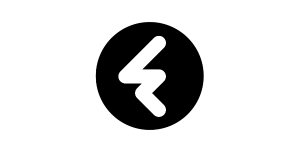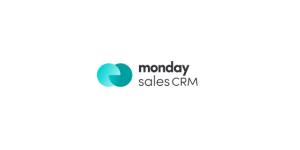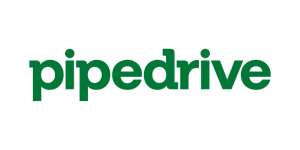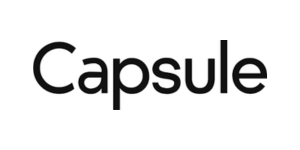What is Todoist?

Todoist is an application for managing tasks and to-do lists that assists users in planning, scheduling, and monitoring tasks and projects. It runs on multiple operating systems, including Windows, iOS, Android, and macOS, and is accessible as a web application. With Todoist's intuitive interface, users can create and manage tasks, assign priorities, set deadlines, and organize tasks into projects and labels.
Todoist is popular among individuals and teams looking for an intuitive and flexible productivity tool for managing day-to-day tasks and long-term projects.
Todoist Pricing
Alongside a free option for basic use, Todoist also provides two premium plans with more advanced features:
- Todoist Pro: $4 per month for solo users.
- Todoist Business: $6 per user, per month for teams.
However, when things get tricky—like handling more complicated projects—Todoist may fall short, and you could find yourself searching for a tool that offers more than just simple task management.
[Related article: 12 Best CRM and Project Management Combined In One Software]
Besides this task management tool, you can also consider these CRM systems to boost business operations:
Why can you consider Todoist alternatives?

Though Todoist has some helpful features, it may not be the best fit for everyone. There are a few drawbacks that make other task management apps more appealing than Todoist. So, why consider switching to a different app?
Free plan limitations
While Todoist does offer a free version, its features are fairly restricted. For instance, access to reminders, activity logs, team inbox, and administrative controls like billing and member roles require upgrading to either the Pro or Business plan.
Lack of built-in time tracking
Effective time tracking supports better time management, keeps projects on schedule, and allows for more precise billing. Unfortunately, Todoist doesn’t have its own time-tracking function, so users must rely on external tools, which could be a major drawback for some.
Few meeting management features
Regular meetings are key to keeping a team aligned, but Todoist lacks robust meeting management features. It doesn't include built-in options for video or voice calls, which can simplify team discussions. In contrast, many competing apps offer integrated communication tools that make team collaboration much easier.
Top 15 Todoist Alternatives
By exploring these different Todoist alternatives, you can find the platform that best supports your goals.
1. TickTick
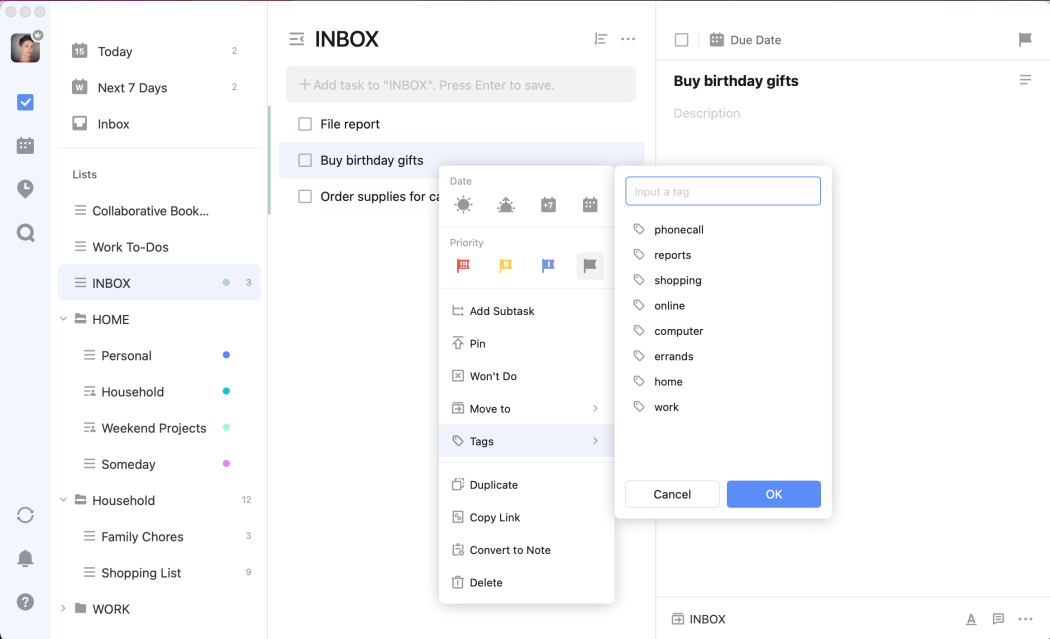
TickTick is a newer app that has quickly gained popularity, offering the best Todoist alternative for users seeking more power and flexibility. TickTick provides a broader range of features and more customization options than Todoist, making it a good choice if you prefer greater control over managing and organizing your tasks.
Its calendar view and habit-tracking features are beneficial for those who like to track tasks and daily routines in a visual format. One standout feature of TickTick is its built-in Pomodoro timer, which lets you easily start a 25-minute work session for any task.
Pros:
- Set reminders based on schedules and locations
- Multiple calendar view options
- Available on iOS and Android
Cons:
- No built-in calendar syncing
- Limited integration options
- The free version limits you to 99 tasks
Pricing:
Basic plan can be upgraded to Premium plan at $35.99 per year.
[Related article: 10 TickTick Alternatives for Task Management]
2. Trello
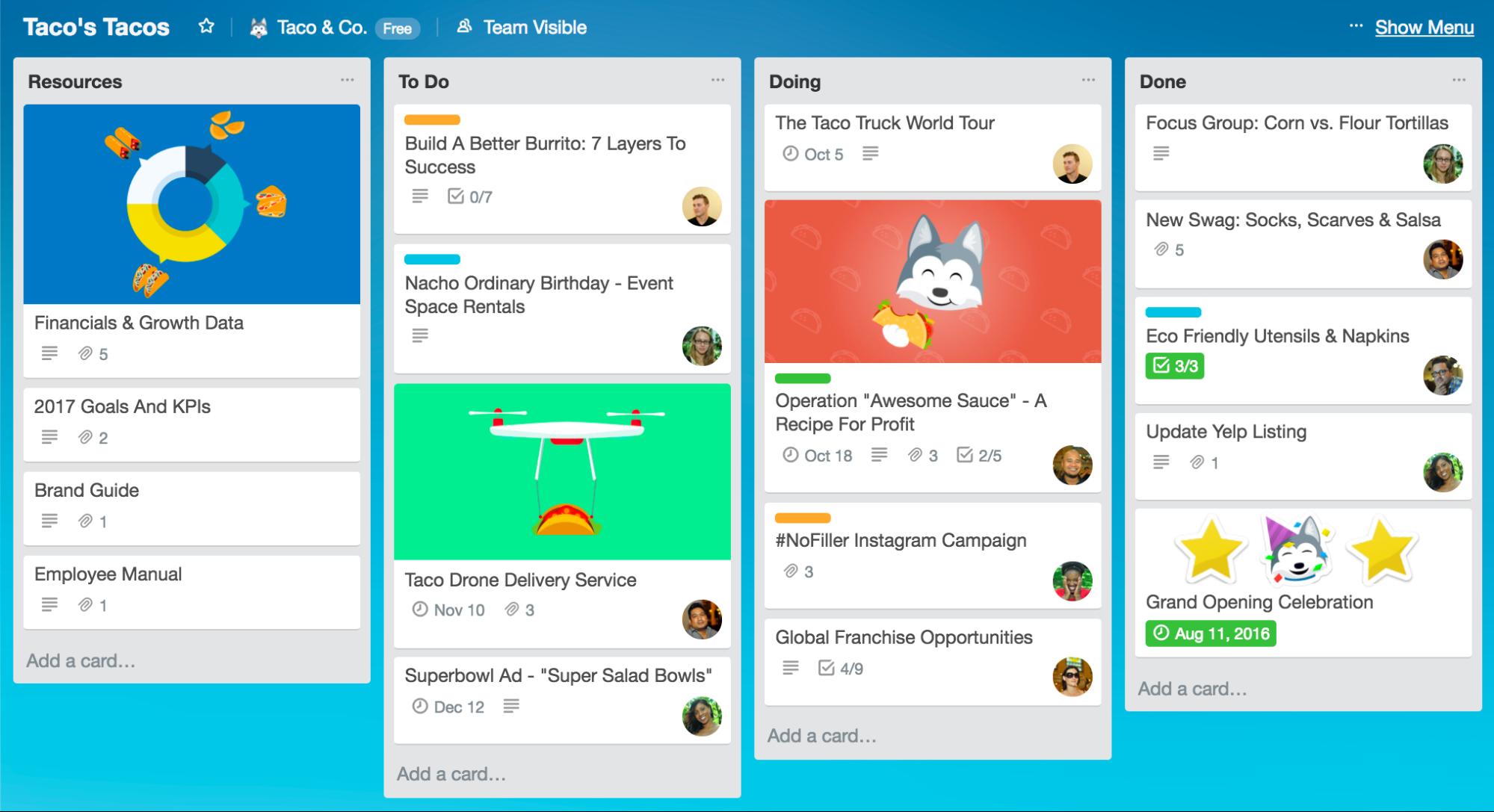
Trello is one of the solid alternatives to Todoist, offering a more flexible, intuitive, and visually oriented approach to task and project management. Its main advantage lies in its balance of simplicity and adaptability. New users can get started quickly, making it easy to onboard an entire team. While Trello's core features are somewhat basic, its functionality can be greatly expanded through a wide variety of Power-Ups.
Trello excels at task visualization, providing more options than Todoist. In addition to a simple list or Kanban-style board, Trello lets users view tasks in formats like timelines, calendars, tables, and even maps.
Pros:
- Strong collaboration tools for teams
- Easy to learn and use
- Checklists within tasks allow for quick updates and feedback
Cons:
- Lacks task dependency features
- Primarily focused on the Kanban board view
- Not ideal for large-scale organizations
Pricing:
- Free plan
- Standard: $5 per user per month, billed annually
- Premium: $10 per user per month, billed annually
- Enterprise: $17.50 per user per month, billed annually
3. Any.do
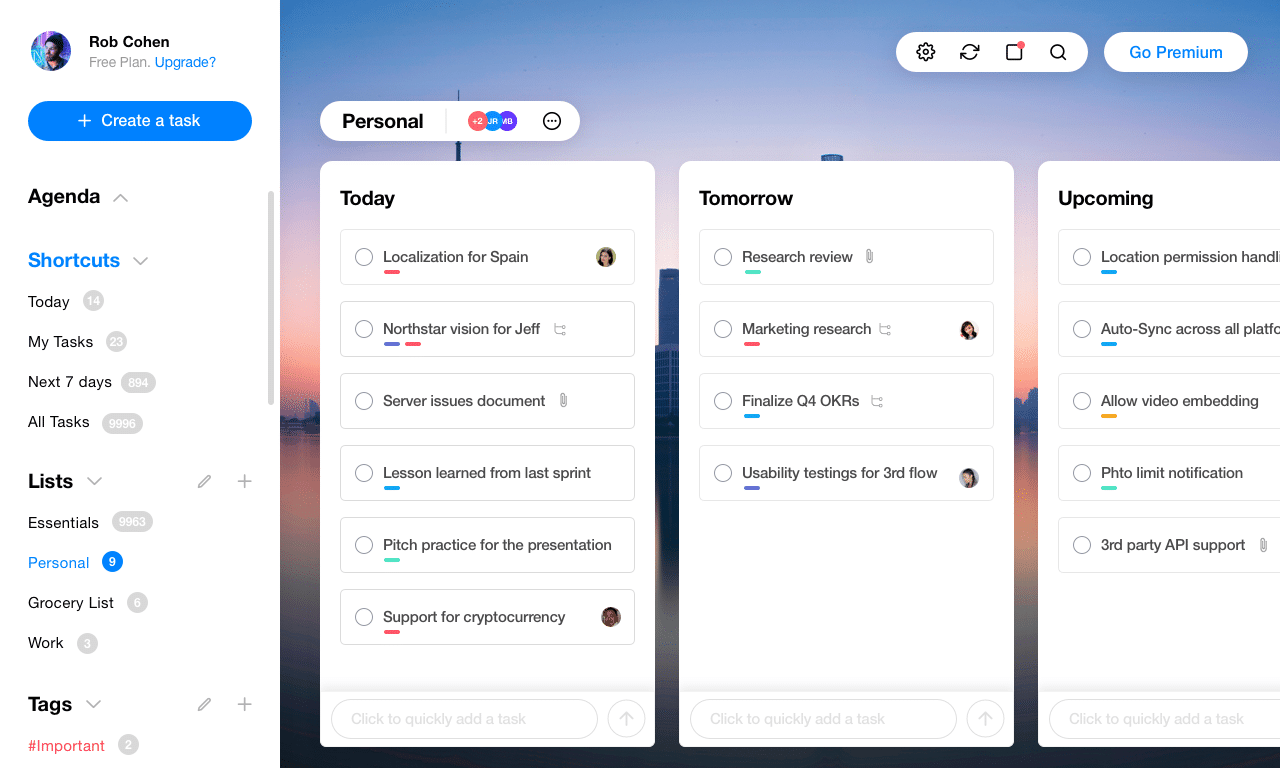
Any.do is a task management app designed with a clean and intuitive interface to help users boost productivity. It's ideal for busy professionals, students, or anyone looking to stay on top of their tasks. With Any.do, you can effortlessly create tasks, assign due dates and reminders, and organize everything into lists.
The app also allows you to share tasks with others for collaborative projects. Additionally, its location-based reminder feature ensures you won't miss an important errand by notifying you when you're near the relevant location.
Pros:
- Acts as the main organizer for personal schedules and events
- Includes a support portal to address platform questions
- Offers Smart Grocery Lists for both Free and Premium users
Cons:
Doesn't integrate with Microsoft Calendar, making it less useful for Microsoft 365 users
Pricing:
- Free plan
- Premium: $4.99 per month, billed annually
- Family: $8.33 per month, billed annually
- Teams: $4.99 per user per month, billed annually
4. Google Keep
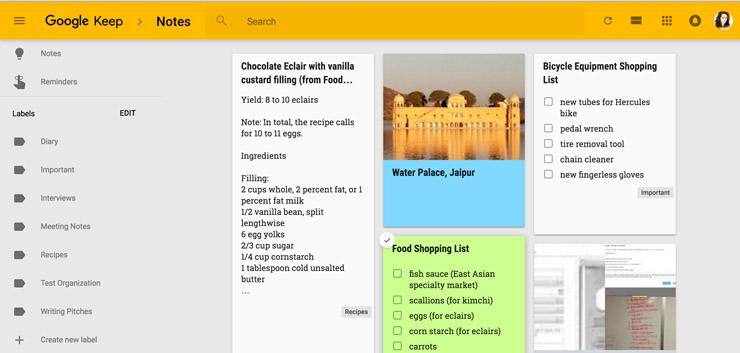
Google Keep is a free note-taking and list-making app developed by Google, designed to help users effortlessly capture and organize ideas while on the move. It lets you quickly take notes, create lists and checklists, set reminders, add photos, collaborate with others, save web pages for later, and more.
The app offers various customization options, allowing you to adjust fonts and colors, attach images and audio, and organize your content with labels. Google Keep is accessible on both iOS and Android devices.
Pros:
- User-friendly and simple interface
- Seamlessly integrates with other Google Suite apps
- Easily share notes and lists with others
Cons:
- Storage space is dependent on your Google account's overall capacity
- Limited features for task collaboration
Pricing:
Google Keep is free for anyone with a Google account.
5. MeisterTask
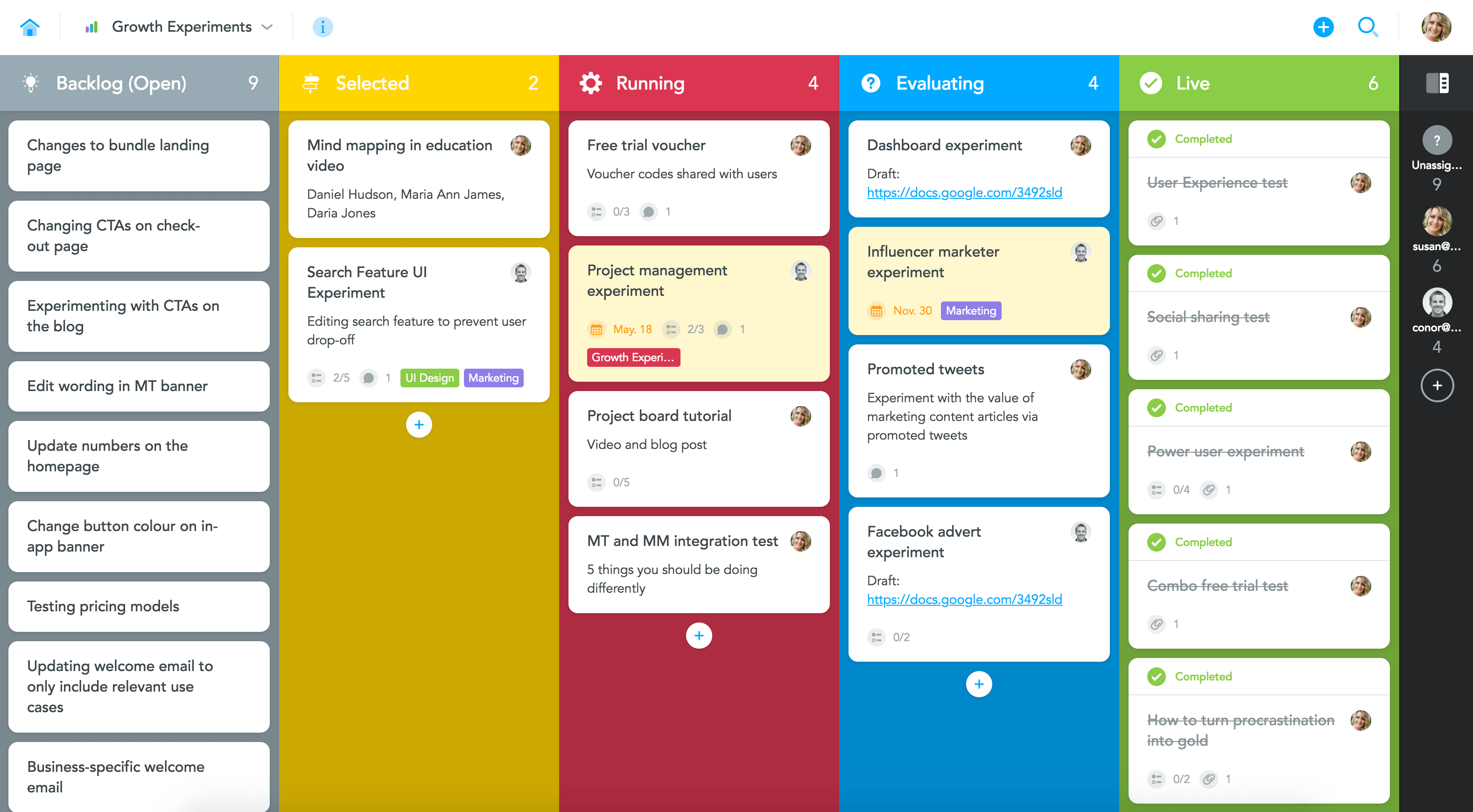
MeisterTask is a project management tool and Todoist alternative built to enhance team communication and organization. With MeisterTask, you can set up projects, create tasks, and organize them into folders, making it easy to stay organized and locate your work. The app includes useful features like labels, due dates, notifications, and more to help optimize task management.
Team collaboration is also a key feature, allowing you to work seamlessly with others on projects for increased efficiency. MeisterTask is suitable for freelancers, teams, and businesses of all sizes.
Pros:
- Interface that is easy to use for both individuals and teams
- Detailed reporting to monitor task progress
- Integrates with popular productivity tools such as Trello and Slack
Cons:
- The free plan offers limited integration options
- Recurring tasks are only available in the paid version
Pricing:
- Basic: Free
- Pro: $7 per user per month, billed annually
- Business: $12.50 per user per month, billed annually
- Enterprise: Contact the vendor
6. Microsoft Planner
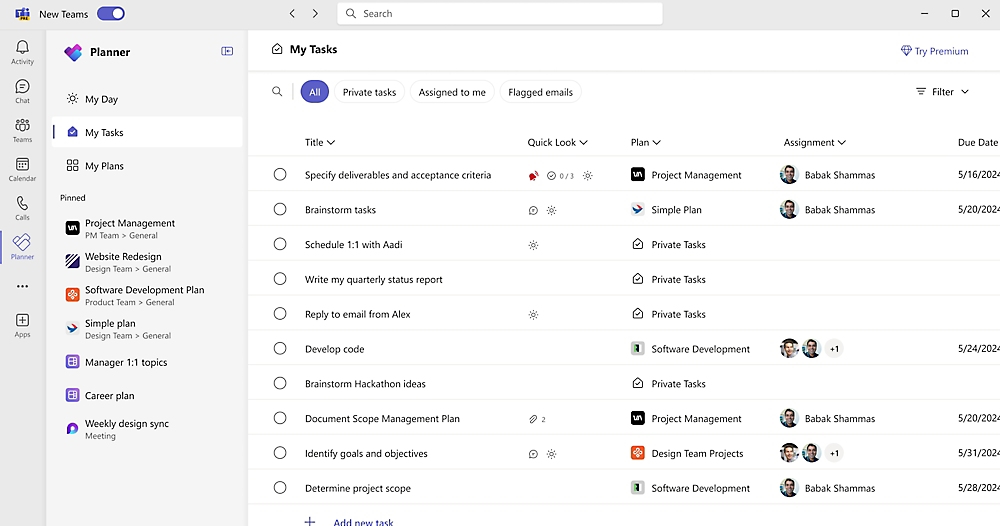
Microsoft Planner is a task and project management tool offered within the Microsoft 365 suite. It enables users to create plans, assign tasks, share documents, and collaborate with others while tracking progress. With its straightforward design, Planner helps teams work more efficiently and stay organized.
The group chat feature allows team members to communicate in real time, ensuring everyone stays aligned. You can also post updates, share files, upload images or videos, and create polls to gather team input.
Pros:
- Seamlessly connects with Teams and other Microsoft products
- User-friendly interface for an improved experience
- Mobile app provides access to tasks and plans on the go
Cons:
- Lacks in-app notifications
- Limited customization options for notification settings
Pricing:
- Planner in Microsoft 365: Free
- Planner Plan 1: $10.00 per user per month
- Project Plan 3: $30.00 per user per month
- Project Plan 5: $55.00 per user per month
7. Asana
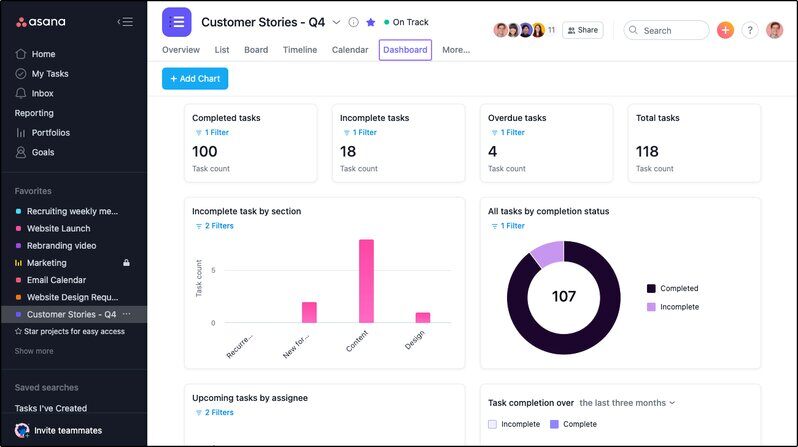
Asana is one of the most widely used alternatives to Todoist, designed to help teams efficiently manage and track their work. Asana provides a variety of task management features, including boards for organizing tasks, lists for following workflows, timelines to plan projects visually, and calendars to monitor upcoming tasks and meetings. It also offers a free plan for teams of up to 15 users.
Asana integrates with many popular apps, allowing you to connect tools like Microsoft Teams, Gmail, Zapier, Canva, Loom, Dropbox, GitLab, and more to streamline your workflow.
Pros:
- Real-time collaboration capabilities
- Supports numerous third-party integrations
- Available on iOS and Android
Cons:
- Lacks an offline mode
- Does not let more than one person work on a single project
- Mobile app falls short compared to the web version
Pricing:
- Personal: free
- Premium: $10.99 per user per month, billed annually
- Business: $24.99 per user per month, billed annually
[Related article: Top 8 Small Business Project Management Software 2024 (Free&Paid)]
8. Zoho Projects
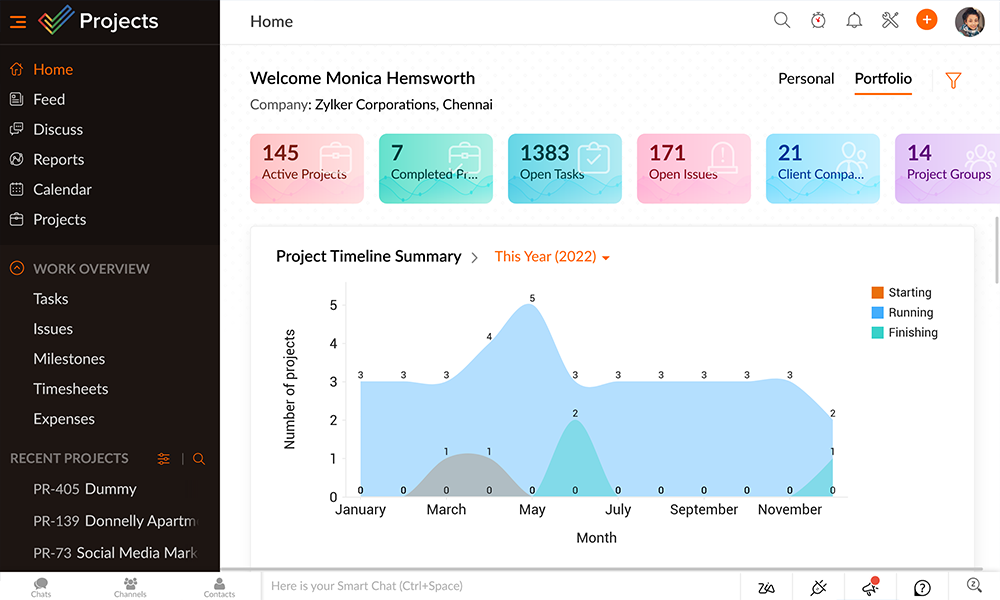
Zoho Projects is an online project management software developed by Zoho, a globally recognized leader in business solutions. This Todoist alternative helps teams manage their projects and resources efficiently, offering features such as task lists, Gantt charts, timesheets, and more.
Zoho Projects enables users to collaborate effortlessly with teams or individuals, monitor task progress, prioritize work, and gain real-time insights into project status. The user-friendly interface allows for project workflow customization, and the mobile app ensures access to projects from any location.
Pros:
- Suitable for teams of any size
- Offers various apps and extensions for an enhanced experience
- Integrates smoothly with other Zoho products
Cons:
- Does not support offline access
- Customizing workspaces has a steep learning curve
Pricing:
- Free plan
- Premium: €4 per user per month, billed annually
- Enterprise: €9 per user per month, billed annually
9. ClickUp
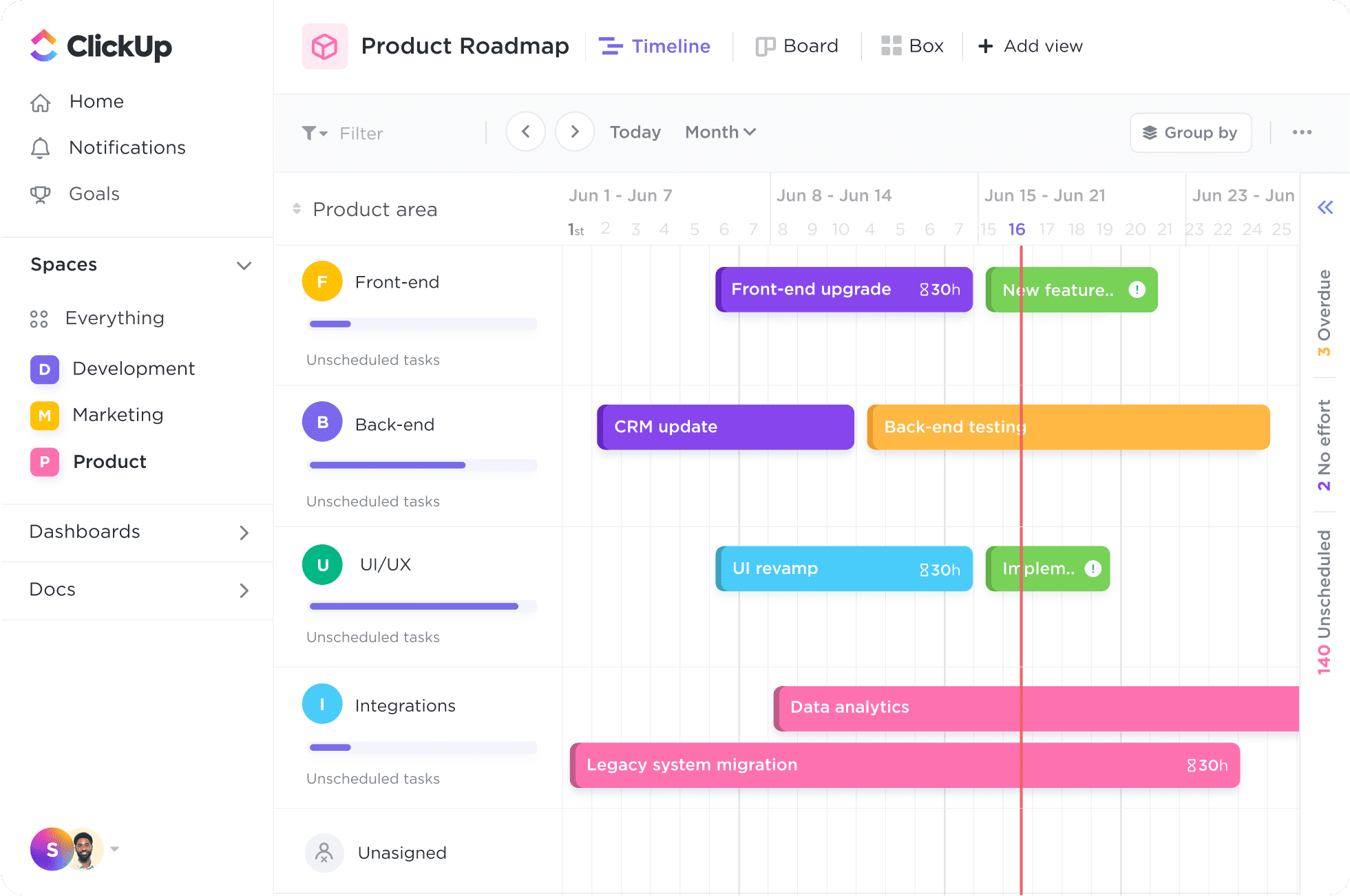
ClickUp is a task management platform and open source Todoist alternative that lets you organize and visualize your tasks in a way that suits your workflow, bringing teams and projects together in one place. With ClickUp Reminders, you can quickly set up notifications for your team, which are easy to modify, attach files to, comment on, update, and customize as needed. ClickUp also simplifies managing your notifications, allowing you to view, clear, respond to, and react to them from any device.
Pros:
- AI-powered text conversion turns content into trackable tasks within ClickUp Docs
- Integrates with over 1,000 other work tools and apps
- Accessible via the ClickUp mobile app
Cons:
- The platform's high level of customizability and numerous features can create a learning curve
Pricing:
- Free plan
- Unlimited: $7 per user per month, billed annually
- Business: $12 per user per month, billed annually
- Enterprise: Contact the vendor
10. Evernote
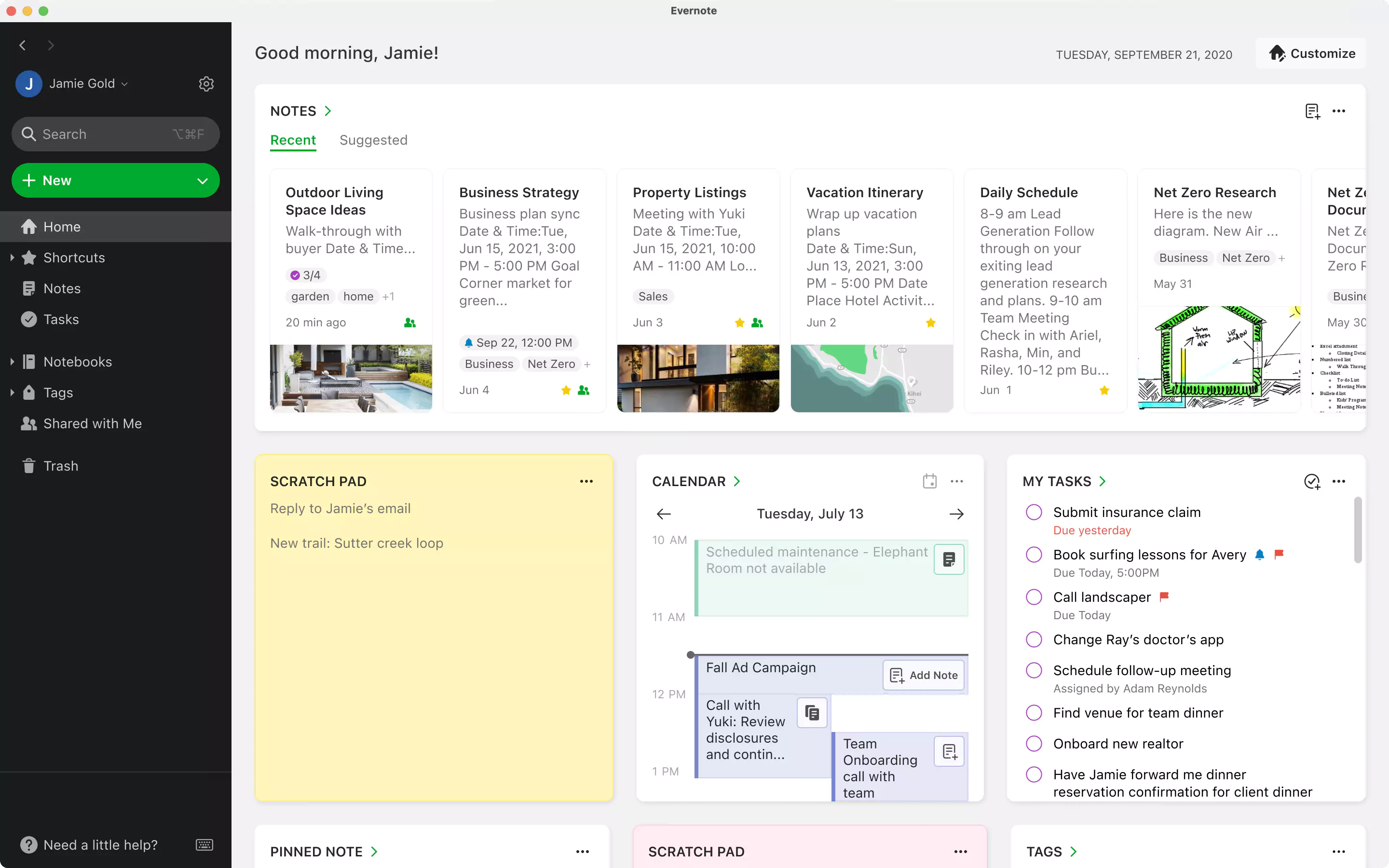
For personal task management, Evernote is an excellent choice. This widely popular digital note-taking app stands out for its array of powerful features. With Evernote's professional plan, you can create, organize, and delegate tasks, integrate your calendar, and even use geographic search to locate notes based on where they were created. It also offers offline access to notes on mobile, PDF annotation, and much more, making it a robust tool for managing personal tasks.
Pros:
- Powerful search capabilities
- Notes are accessible from multiple devices
- View and edit notes even without an internet connection (with a premium plan)
- Integrate with your calendar for better scheduling and note association
Cons:
- Limited free version
- Some users find the interface overwhelming
- Limited collaboration tools
Pricing:
- Free plan
- Personal: ₴115.00 per month
- Professional: ₴139.38 per month
- Teams: ₴279.00 per month
[Related article: Notion vs Evernote: Which note-taking tool is superior in 2024?]
11. Basecamp
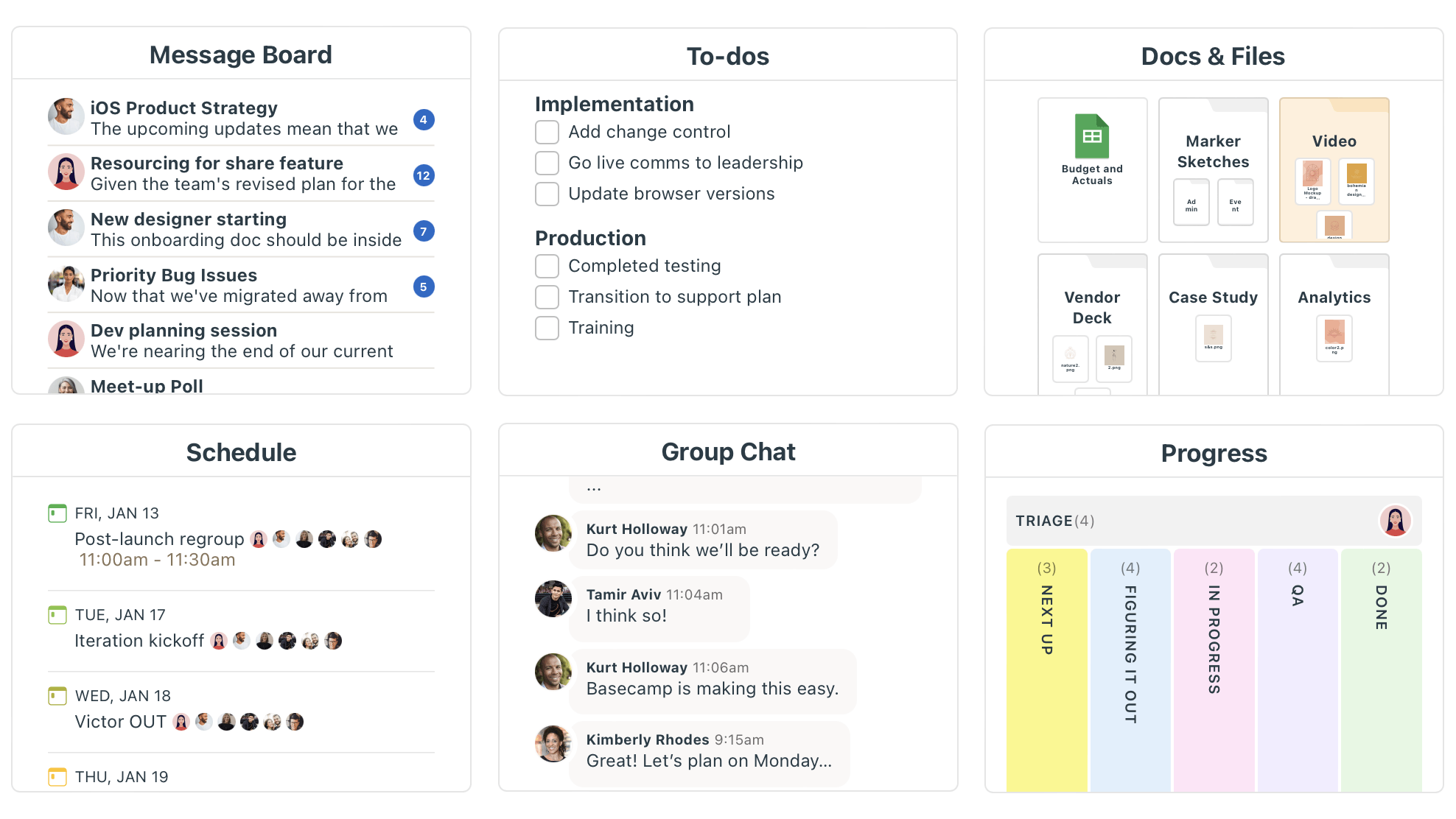
Basecamp is a well-known project management tool designed to simplify task management and team collaboration. It provides a straightforward platform where teams can organize their work, communicate through message boards, share files, and keep track of project progress.
Basecamp is ideal for teams that want to reduce the clutter of email and scattered tools by consolidating all their work in one place. Its simplicity makes it appealing for small to mid-sized teams, though larger organizations may find it lacking in advanced features.
Pros:
- Simple and intuitive interface
- Built-in team communication tools (message boards, chat)
- File sharing and document management
Cons:
- Limited advanced project management features
- May be too basic for larger or more complex projects
Pricing:
- Basecamp: $15 per user per month
- Basecamp Pro Unlimited: $299/month, billed annually
12. Redbooth
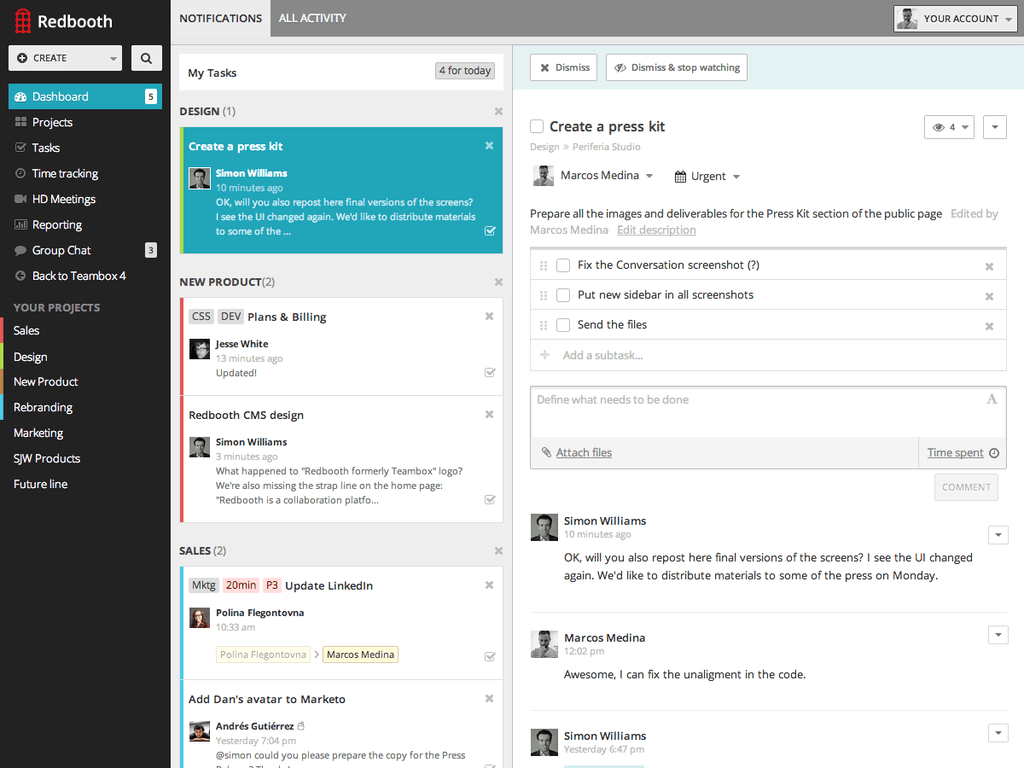
Redbooth is a project management and collaboration tool that combines task management, team communication, and project tracking features in one platform. It is designed for teams of all sizes who need a simple yet effective way to manage projects and track progress.
Redbooth offers Gantt charts, task lists, and Kanban boards for organizing work, while its built-in communication tools allow teams to collaborate in real time. The platform is highly visual and easy to use, making it suitable for teams that need a straightforward solution.
Pros:
- Task and project tracking with Gantt charts
- Team communication features, including chat and file sharing
- Intuitive interface and easy to use
Cons:
- Limited integrations with other tools
- Some users find advanced features lacking compared to competitors
Pricing:
- Free plan
- Pro: $12 per user per month, billed annually
- Business: $18.75 per user per month, billed annually
- Enterprise: Contact the vendor
13. Zenkit
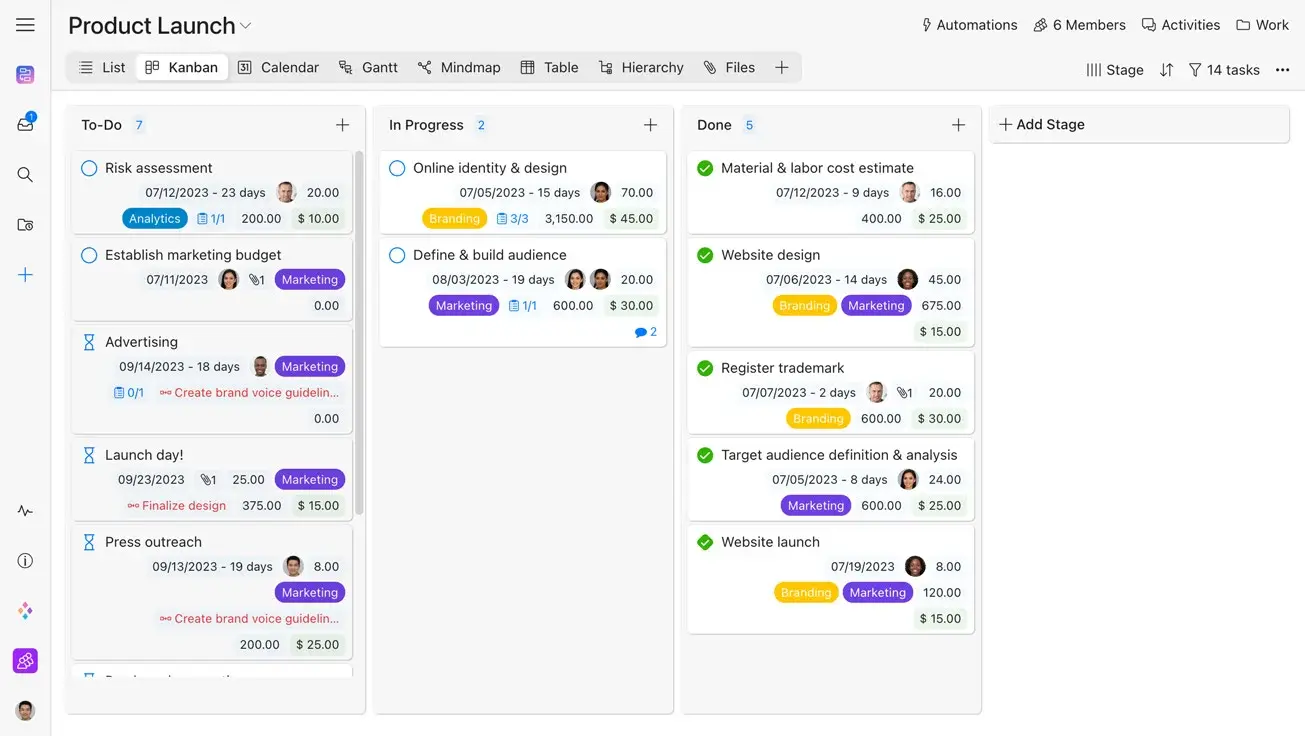
Zenkit is a versatile project management platform and one of free alternatives to Todoist that allows users to manage tasks in various views, including lists, Kanban boards, calendars, tables, and mind maps. Its flexibility makes it suitable for a wide range of project management needs, from simple to complex projects.
Zenkit offers extensive customization options, allowing teams to tailor the platform to their specific workflows. It also integrates with other popular tools like Zapier, making it easy to connect with existing workflows.
Pros:
- Different views, such as calendars, boards, and lists
- Very adaptable with a range of field kinds and perspectives
- Integration with Zapier and other tools
Cons:
- For inexperienced users, the UI may be too complex.
- Certain features are exclusive to higher-tier plans.
Pricing:
- Personal: Free
- Plus: $8 per user per month, billed annually
- Business: $21 per user per month, billed annually
- Enterprise: Contact the vendor
14. Quire
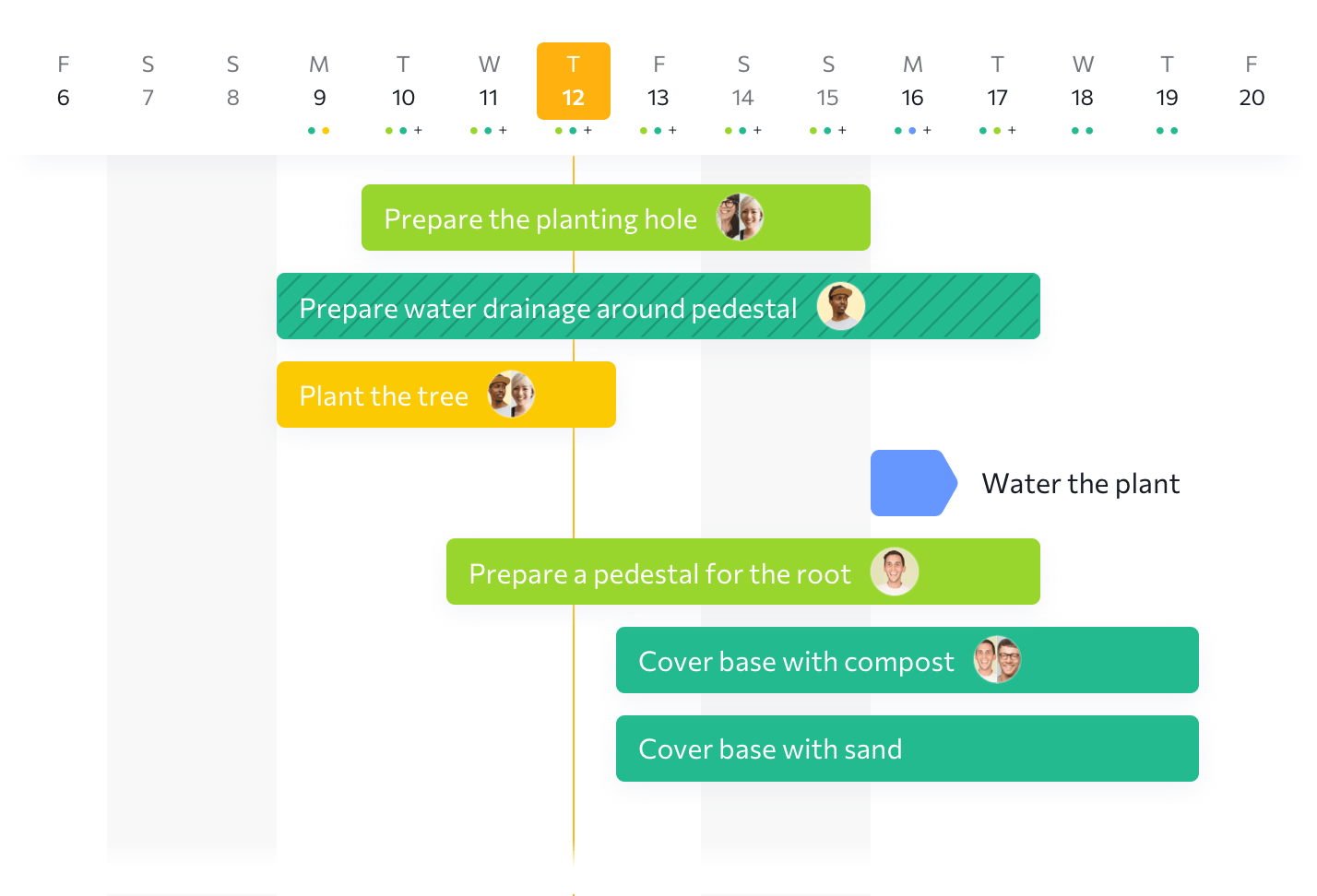
Quire is a task management and project collaboration tool designed for teams that need to organize complex tasks and break them down into smaller, manageable steps. Its unique hierarchical task structure allows users to create subtasks within tasks, making it ideal for projects that require detailed planning.
Quire also offers Kanban boards for visual task management and integrates real-time team collaboration through chat. The interface is designed to be minimalistic and distraction-free, keeping the focus on productivity.
Pros:
- User-friendly and intuitive interface
- Task lists and boards for flexible project organization
- Real-time chat for team communication
- Hierarchical task structure for detailed project planning
Cons:
- Limited integrations with other tools
- Advanced features may require paid plans
Pricing:
- Free plan
- Professional: $7.65 per user per month, billed annually
- Premium: $13.95 per user per month, billed annually
- Enterprise: $19.95 per user per month, billed annually
15. Hygger
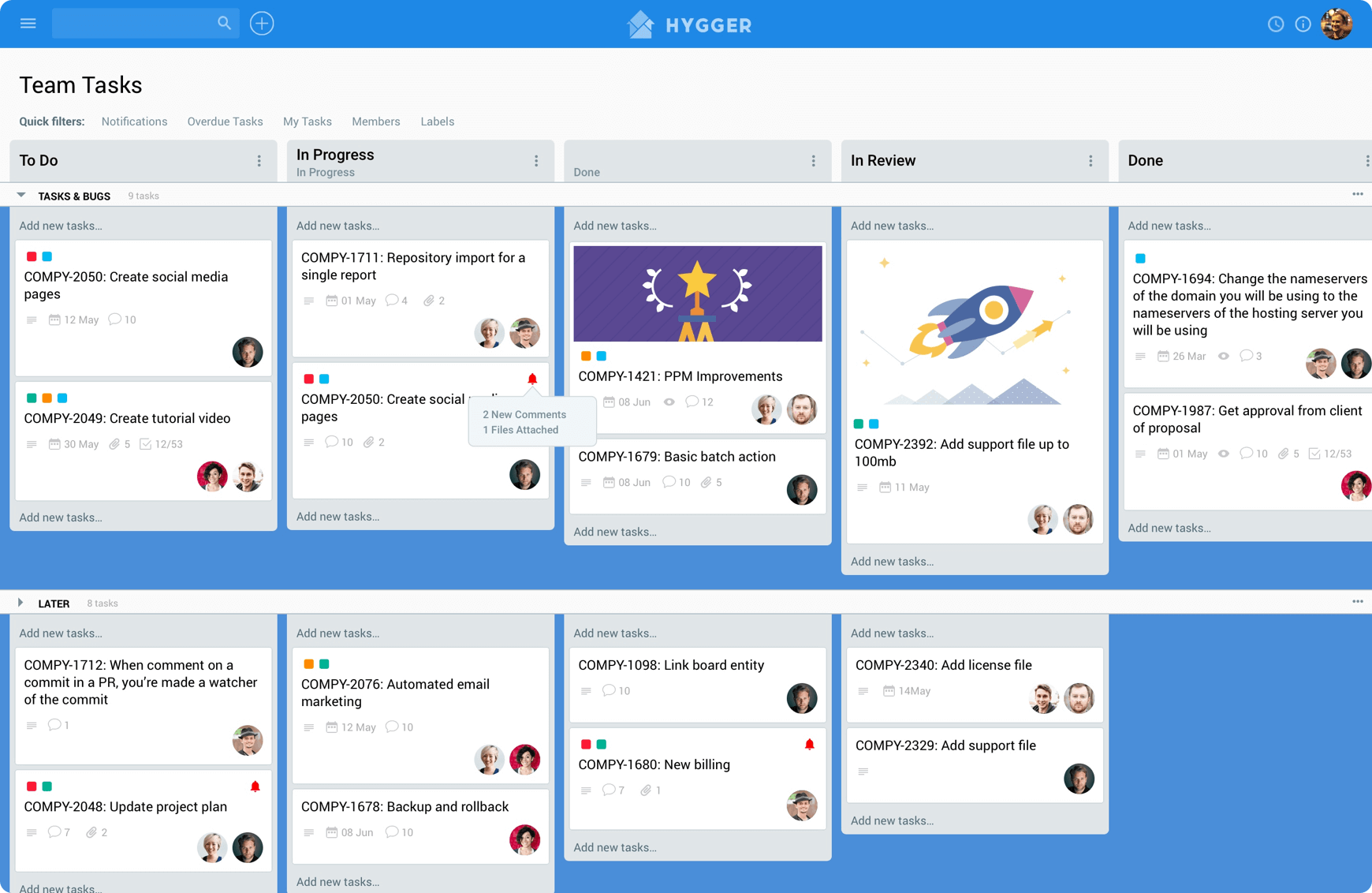
Hygger is a project management tool built with Agile and Lean methodologies in mind. It is designed to help teams prioritize tasks, manage backlogs, and create project roadmaps for a more organized workflow. Hygger's unique prioritization matrix helps teams focus on high-value tasks that deliver the most impact. The platform also supports Kanban boards, sprints, and timelines for managing projects from start to finish. Hygger is ideal for tech-savvy teams and companies that need Agile tools for effective task management and collaboration.
Pros:
- Prioritization features for managing tasks and projects
- Roadmaps for visualizing project timelines
- Supports Agile methodologies
- Comprehensive reporting and analytics
Cons:
- Can be complex for users unfamiliar with Agile
- Limited integrations compared to some competitors
Pricing:
- Free plan
- Standard: $7 per user/monthly
- Enterprise: $7 per user/monthly
To Sum Up
In conclusion, there is a wide variety of Todoist alternatives that cater to different project management and task organization needs. While Todoist remains a popular option for its simplicity and powerful features, other tools like Asana, Basecamp, and ClickUp provide more robust functionality for larger teams and complex projects. Tools such as Quire and Zenkit offer greater customization and flexibility, while Hygger and Redbooth focus on Agile methodologies and collaboration.
There are certain advantages and disadvantages to each of these options. For instance, some tools offer extensive integration options, built-in communication tools, or advanced project tracking features, while others may have limitations like a steeper learning curve or fewer customization options. Choosing the right tool depends on your specific requirements—whether you need simple task management, advanced project planning, team collaboration, or Agile support.
